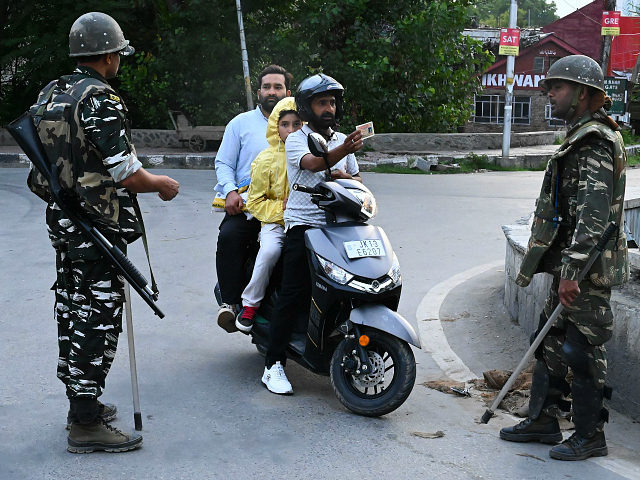Security forces in India reportedly imposed tight restrictions on mosques across Indian-administered Kashmir for Monday’s Eid al-Adha Muslim holiday.
New Delhi intensified its clampdown over Indian Kashmir to stave off anti-government protests over India’s move to rescind the Muslim-majority region’s autonomy last week, the Agency France-Presse (AFP) news agency reported Monday, adding:
The Himalayan region’s biggest mosque, the Jama Masjid, was ordered closed and people were only allowed to pray in smaller local mosques so that no big crowds could gather, witnesses said.
Occupied Kashmir has been in a security lockdown for eight days as India’s Hindu nationalist government, led by Bharatiya Janata Party (BJP), seeks to snuff out opposition to its move to impose tighter central control over the region.
Last week, the Hindu nationalist-led Indian government revoked Kashmir’s limited autonomy and broke the region into two federally administered territories.
India’s decision came amid an indefinite security lockdown and a communication blackout, including the blocking of phone lines, the internet, and news outlets that reportedly continues.
New Delhi also deployed thousands of additional troops in anticipation of its move. Indian security forces have already arrested more than 500 people.
The Associated Press (AP) noted Monday:
Troops in India-administered Kashmir allowed some Muslims to walk to local mosques alone or in pairs to pray for the Eid al-Adha festival on Monday during an unprecedented security lockdown that still forced most people in the disputed region to stay indoors on the Islamic holy day.
Some protesters demonstrated against the Indian government’s surprise revocation of Muslim-majority Kashmir’s special status last week. All communications and the internet remained cut off for an eighth day. The streets were deserted, with authorities not allowing any large groups to gather to avoid anti-India protests.
New Delhi-administered Kashmir is the only Muslim-majority region in India.
“Our hearts are on fire,” 75-year-old Habibullah Bhat told AP, noting that he came out to pray despite his failing health. “India has thrown us into the dark ages, but God is on our side and our resistance will win.”
After the prayers, hundreds of worshippers gathered in Indian-held Kashmir and chanted, “We want freedom” and “Go India, Go back,” unnamed witnesses told AP.
Indian officials claimed the protests ended “peacefully.”
Via Twitter, police in Indian Kashmir said Eid festival prayers “concluded #peacefully in various parts of the [Kashmir] #valley. No untoward incident reported so far.”
News outlets were unable to verify the allegations independently because of the communications shut down.
New Delhi’s clampdown in Kashmir is expected to last through Thursday, India’s independence day, AP reported, adding:
The restrictions had been briefly eased for Friday prayers last week and for shopping ahead of Eid. … Residents have begun to face shortages of food and other necessities as shops remain shuttered and public movement is restricted. Parents have struggled to entertain their children who are unable to go to school. Patients have faced shortages of prescription drugs.
Authorities say they have made cash available in ATMs so that residents could take out money to buy essentials for Eid.
Muslims across the world reportedly celebrated Eid Al-Adha (“Festival of the Sacrifice”) by sacrificing animals, including cows, which are honored by Hindus as representatives of the divine.
“Mob attacks by violent extremist Hindu groups against minority communities, especially Muslims, continued throughout the year amid rumors that victims had traded or killed cows for beef,” a U.S. State Department report issued in June and immediately rejected by India revealed.
Echoing human rights groups, the State Department blasted India’s Hindu nationalist government for inciting hatred against religious minorities, including Christians and Muslims, and failing to protect them.
Pakistan and China warned that India’s move in Kashmir could lead to “genocide” or “ethnic cleansing.”
Echoing a similar assessment from last year, the United Nations last month reported a rise in human rights violations and killing of civilians in Indian Kashmir. India denied the accusations.
Last year, casualties in Indian Kashmir alone reached the highest level (500-plus) in decades.
Pakistan, China, and India all have competing claims to territories in Kashmir.
A border — the Line of Control (LOC) — separates Indian Kashmir from the portion of the region controlled by Pakistan. Islamabad has ceded control of some of its Kashmir territories to China. India disputes China’s occupation of Kashmir lands on its side of the LOC.
Last week, New Delhi also deemed the Indian Kashmir lands controlled by China to be areas administered by the Indian federal government, angering Beijing.
Both China and its strong ally Pakistan came out against India’s move in Kashmir last week. Pakistan and India have fought two wars and a minor conflict over Kashmir. China and India have fought one war over the region.
Pakistan warned that New Delhi’s recent move to strip Indian Kashmir of its autonomy could lead to another war.

COMMENTS
Please let us know if you're having issues with commenting.